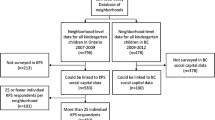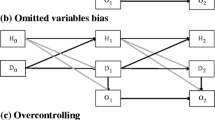Abstract
Despite previous studies showing that children’s development of executive function (EF) skills is associated with the differing contexts in which children live, evidence about the independent and synergistic effects of families and neighborhoods is limited. Using a sample from a two-cohort longitudinal study of preschoolers from low-income families, we examined whether residential neighborhood resources (measured with the Child Opportunity Index (COI)) moderated the relationship between family cumulative risk and the growth trajectory of children’s EF skills. Results from conditional growth curve models indicate family cumulative risk was negatively related to baseline EF skills and the rate of EF skill growth. In contrast, the overall COI and the COI social and economic domain z-score were positively associated with the initial, but not linear, growth of EF skills. We found no evidence of moderator effects. Policies that aim to better target and support the most vulnerable children should consider the unique contribution of family risks and neighborhood resources to child development.

Similar content being viewed by others
Data Availability
The datasets generated during and/or analyzed during the current study are available from the corresponding author on reasonable request.
References
Acevedo-Garcia, D., Noelke, C., McArdle, N., Sofer, N., Hardy, E. F., Weiner, M., Baek, M., Huntington, N., Huber, R., & Reece, J. (2020). Racial and ethnic inequities in children’s neighborhoods: Evidence from the new child opportunity index 2.0. Health Affairs, 39(10), 1693–1701. https://doi.org/10.1377/hlthaff.2020.00735
Aris, I. M., Rifas-Shiman, S. L., Jimenez, M. P., Li, L. J., Hivert, M. F., Oken, E., & James, P. (2021). Neighborhood child opportunity index and adolescent cardiometabolic risk. Pediatrics, 147(2). https://doi.org/10.1542/peds.2020-018903
Beck, A. F., Huang, B., Wheeler, K., Lawson, N. R., Kahn, R. S., & Riley, C. L. (2017). The child opportunity index and disparities in pediatric asthma hospitalizations across one ohio metropolitan area, 2011–2013. Journal of Pediatrics, 190, 200-206.e1. https://doi.org/10.1016/j.jpeds.2017.08.007
Best, J. R., & Miller, P. H. (2010). A developmental perspective on executive function. Child Development, 81(6), 1641–1660. https://doi.org/10.1111/j.1467-8624.2010.01499.x
Blair, C. (2016). Developmental science and executive function. Current Directions in Psychological Science, 25(1), 3–7. https://doi.org/10.1177/0963721415622634
Blair, C., & Raver, C. C. (2012). Child development in the context of adversity; Experiential canalization of brain and behavior. American Psychologist, 67(4), 309–318. https://doi.org/10.1037/a0027493
Bronfenbrenner, U., & Morris, P. A. (1998). The ecology of developmental processes. In W. Damon & R. M. Lerner (Eds.), Handbook of child psychology: Theoretical models of human development (pp. 993–1028). John Wiley & Sons Inc.
Carlson, S. M., Zelazo, P. D., & Faja, S. (2013). Executive function. In P. D. Zelazo (Ed.), The Oxford Handbook of Developmental Psychology, Vol. 1: Body and Mind (Vol. 1, Issue October, pp. 705–743). Oxford University Press. https://doi.org/10.1093/oxfordhb/9780199958450.013.0025
Enders, C. K., Du, H., & Keller, B. T. (2020). A model-based imputation procedure for multilevel regression models with random coefficients, interaction effects, and nonlinear terms. Psychological Methods, 25(1), 88–112. https://doi.org/10.1037/met0000228
Evans, G. W., Chen, E., Miller, G., & Seeman, T. (2012). How poverty gets under the skin: A life course perspective. In The Oxford Handbook of Poverty and Child Development (Vol. 9780199769, Issue March). https://doi.org/10.1093/oxfordhb/9780199769100.013.0001
Evans, G. W., & Kim, P. (2013). Childhood poverty, chronic stress, self-regulation, and coping. Child Development Perspectives, 7(1), 43–48. https://doi.org/10.1111/cdep.12013
Evans, G. W., Li, D., & Whipple, S. S. (2013). Cumulative risk and child development. Psychological Bulletin, 139(6), 1342–1396. https://doi.org/10.1037/a0031808
Gelman, A., & Rubin, D. B. (1992). Inference from iterative simulation using multiple sequences. Statistical Science, 7(4), 457–472.
Giuliano, R. J., Roos, L. E., Farrar, J. D., & Skowron, E. A. (2018). Cumulative risk exposure moderates the association between parasympathetic reactivity and inhibitory control in preschool-age children. Developmental Psychobiology, 60(3), 324–332. https://doi.org/10.1002/dev.21608
Graham, J. W. (2009). Missing data analysis: Making it work in the real world. Annual Review of Psychology, 60, 549–576. https://doi.org/10.1146/annurev.psych.58.110405.085530
Hackman, D. A., Betancourt, L. M., Gallop, R., Romer, D., Brodsky, N. L., Hurt, H., & Farah, M. J. (2014). Mapping the trajectory of socioeconomic disparity in working memory: Parental and neighborhood factors. Child Development, 85(4), 1433–1445. https://doi.org/10.1111/cdev.12242
Hackman, D. A., Gallop, R., Evans, G. W., & Farah, M. J. (2015). Socioeconomic status and executive function: Developmental trajectories and mediation. Developmental Science, 18(5), 686–702. https://doi.org/10.1111/desc.12246
Hardy, E., Joshi, P., Leonardos, M., & Acevedo-garcia, D. (2021). Advancing Racial equity through neighborhood-informed early childhood policies: A research and policy review (Issue September). https://www.diversitydatakids.org/research-library/research-report/advancing-racial-equity-through-neighborhood-informed-early
Last, B. S., Lawson, G. M., Breiner, K., Steinberg, L., & Farah, M. J. (2018). Childhood socioeconomic status and executive function in childhood and beyond. PLoS ONE, 13(8), 1–12. https://doi.org/10.1371/journal.pone.0202964
Lawson, G. M., Hook, C. J., & Farah, M. J. (2018). A meta-analysis of the relationship between socioeconomic status and executive function performance among children. Developmental Science, 21(2), 1–22. https://doi.org/10.1111/desc.12529
Lengua, L. J., Kiff, C., Moran, L., Zalewski, M., Thompson, S., Cortes, R., & Ruberry, E. (2014). Parenting mediates the effects of income and cumulative risk on the development of effortful control. Social Development, 23(3), 631–649. https://doi.org/10.1111/sode.12071
Leventhal, T., & Brooks-Gunn, J. (2000). The neighborhoods they live in: The effects of neighborhood residence on child and adolescent outcomes. Psychological Bulletin, 126(2), 309–337. https://doi.org/10.1037/0033-2909.126.2.309
Leventhal, T., Dupéré, V., & Shuey, E. A. (2015). Children in neighborhoods. In M. H. Bornstein, T. Leventhal, & R. M. Lerner (Eds.), Handbook of child psychology and developmental science: Ecological settings and processes (pp. 493–533). John Wiley & Sons Inc.
Lima, J., Caughy, M., Nettles, S. M., & O’Campo, P. J. (2010). Effects of cumulative risk on behavioral and psychological well-being in first grade: Moderation by neighborhood context. Social Science and Medicine, 71(8), 1447–1454. https://doi.org/10.1016/j.socscimed.2010.06.022
Masarik, A. S., & Conger, R. D. (2017). Stress and child development: A review of the Family Stress Model. Current Opinion in Psychology, 13, 85–90. https://doi.org/10.1016/j.copsyc.2016.05.008
McClelland, M. M., Acock, A. C., Piccinin, A., Rhea, S. A., & Stallings, M. C. (2013). Relations between preschool attention span-persistence and age 25 educational outcomes. Early Childhood Research Quarterly, 28(2), 314–324. https://doi.org/10.1016/j.ecresq.2012.07.008
McCoy, D. C., Connors, M. C., Morris, P. A., Yoshikawa, H., & Friedman-Krauss, A. H. (2015). Neighborhood economic disadvantage and children’s cognitive and social-emotional development: Exploring Head Start classroom quality as a mediating mechanism. Early Childhood Research Quarterly, 32, 150–159. https://doi.org/10.1016/j.ecresq.2015.04.003
Minh, A., Muhajarine, N., Janus, M., Brownell, M., & Guhn, M. (2017). A review of neighborhood effects and early child development: How, where, and for whom, do neighborhoods matter? Health and Place, 46(2016), 155–174. https://doi.org/10.1016/j.healthplace.2017.04.012
Moffitt, T. E., Arseneault, L., Belsky, D., Dickson, N., Hancox, R. J., Harrington, H. L., Houts, R., Poulton, R., Roberts, B. W., Ross, S., Sears, M. R., Thomson, W. M., & Caspi, A. (2011). A gradient of childhood self-control predicts health, wealth, and public safety. Proceedings of the National Academy of Sciences of the United States of America, 108(7), 2693–2698. https://doi.org/10.1073/pnas.1010076108
Nesbitt, K. T., Baker-Ward, L., & Willoughby, M. T. (2013). Executive function mediates socio-economic and racial differences in early academic achievement. Early Childhood Research Quarterly, 28(4), 774–783. https://doi.org/10.1016/j.ecresq.2013.07.005
Noble, K. G., McCandliss, B. D., & Farah, M. J. (2007). Socioeconomic gradients predict individual differences in neurocognitive abilities. Developmental Science, 10(4), 464–480. https://doi.org/10.1111/j.1467-7687.2007.00600.x
Pianta, R. C., La Paro, K. M., & Hamre, B. K. (2008). Classroom Assessment Scoring System. Brookes Publishing Co.
Ponitz, C. C., McClelland, M. M., Matthews, J. S., & Morrison, F. J. (2009). A structured observation of behavioral regulation and its contributions kindergarten outcomes. Developmental Psychology, 45, 605–619. https://doi.org/10.1037/a0015365
Reilly, S. E., Downer, J. T., & Grimm, K. J. (2022). Developmental trajectories of executive functions from preschool to kindergarten. Developmental Science, July 2021, 1–14. https://doi.org/10.1111/desc.13236
Roche, K. M., & Leventhal, T. (2009). Beyond neighborhood poverty: Family management, neighborhood disorder, and adolescents’ early sexual onset. Journal of Family Psychology, 23(6), 819–827. https://doi.org/10.1037/a0016554
Roy, A. L., McCoy, D. C., & Cybele Raver, C. (2014). Instability versus quality: Residential mobility, neighborhood poverty, and children’s self-regulation. Developmental Psychology, 50(7), 1891–1896. https://doi.org/10.1037/a0036984
Sarsour, K., Sheridan, M., Jutte, D., Nuru-Jeter, A., Hinshaw, S., & Boyce, W. T. (2011). Family socioeconomic status and child executive functions: The roles of language, home environment, and single parenthood. Journal of the International Neuropsychological Society, 17(1), 120–132. https://doi.org/10.1017/S1355617710001335
Sharkey, P., & Faber, J. W. (2014). Where, when, why, and for whom do residential contexts matter? Moving away from the dichotomous understanding of neighborhood effects. Annual Review of Sociology, 40, 559–579. https://doi.org/10.1146/annurev-soc-071913-043350
Smith-Donald, R., Raver, C. C., Hayes, T., & Richardson, B. (2007). Preliminary construct and concurrent validity of the Preschool Self-regulation Assessment (PSRA) for field-based research. Early Childhood Research Quarterly, 22(2), 173–187. https://doi.org/10.1016/j.ecresq.2007.01.002
St. John, A. M., & Tarullo, A. R. (2020). Neighbourhood chaos moderates the association of socioeconomic status and child executive functioning. Infant and Child Development, 29(1), e2153. https://doi.org/10.1002/icd.2153
StataCorp. (2017). Stata statistical software: Release 15. StataCorp LLC.
Wei, W. S., McCoy, D. C., Busby, A. K., Hanno, E. C., & Sabol, T. J. (2021). Beyond neighborhood socioeconomic status: Exploring the role of neighborhood resources for preschool classroom quality and early childhood development. American Journal of Community Psychology, 67(3–4), 470–485. https://doi.org/10.1002/ajcp.12507
Willoughby, M. T., Blair, C. B., & The Family Life Project Investigators. (2016). Measuring executive function in early childhood: A case for formative measurement. Psychological Assessment, 28(3), 319–330.https://doi.org/10.1037/pas0000152
Zelazo, P. D., Blair, C., & Willoughby, M. T. (2016). Executive function: Implications for education (NCER 2017–2000). http://ies.ed.gov/
Funding
This work was supported by the National Institute of Child Health and Human Development of the National Institutes of Health under award number 2R01HD051498-06A1.
Author information
Authors and Affiliations
Corresponding author
Ethics declarations
Ethical Approval
This study was performed in line with the principles of the Declaration of Helsinki. Approval was granted by the Institutional Review Board for Social and Behavioral Sciences of University of Virginia (No. 2015–0443-000).
Informed Consent
Written informed consent was obtained from the parents and teachers.
Conflict of Interest
The authors declare no competing interests.
Additional information
Publisher's Note
Springer Nature remains neutral with regard to jurisdictional claims in published maps and institutional affiliations.
Rights and permissions
Springer Nature or its licensor (e.g. a society or other partner) holds exclusive rights to this article under a publishing agreement with the author(s) or other rightsholder(s); author self-archiving of the accepted manuscript version of this article is solely governed by the terms of such publishing agreement and applicable law.
About this article
Cite this article
Cubides-Mateus, D.M., LoCasale-Crouch, J. & Turnbull, K.L.P. Do Neighborhood Resources Mitigate Family Risk to Preschool Children’s Executive Function Skills Growth?. Prev Sci 24, 115–125 (2023). https://doi.org/10.1007/s11121-022-01480-3
Accepted:
Published:
Issue Date:
DOI: https://doi.org/10.1007/s11121-022-01480-3




